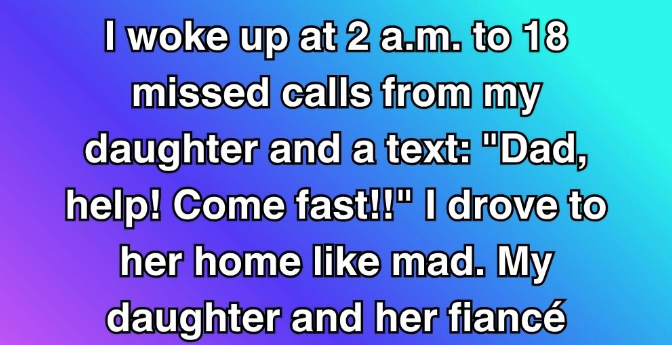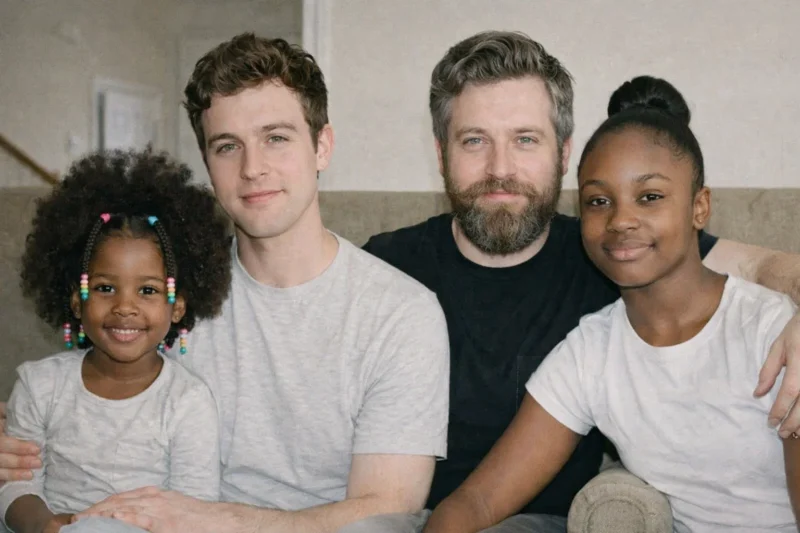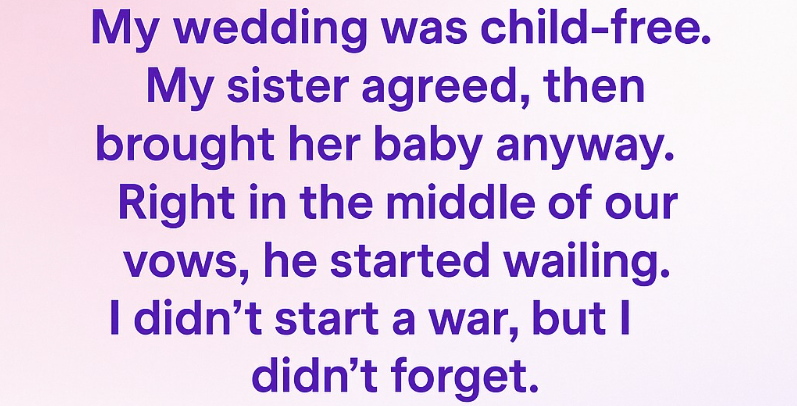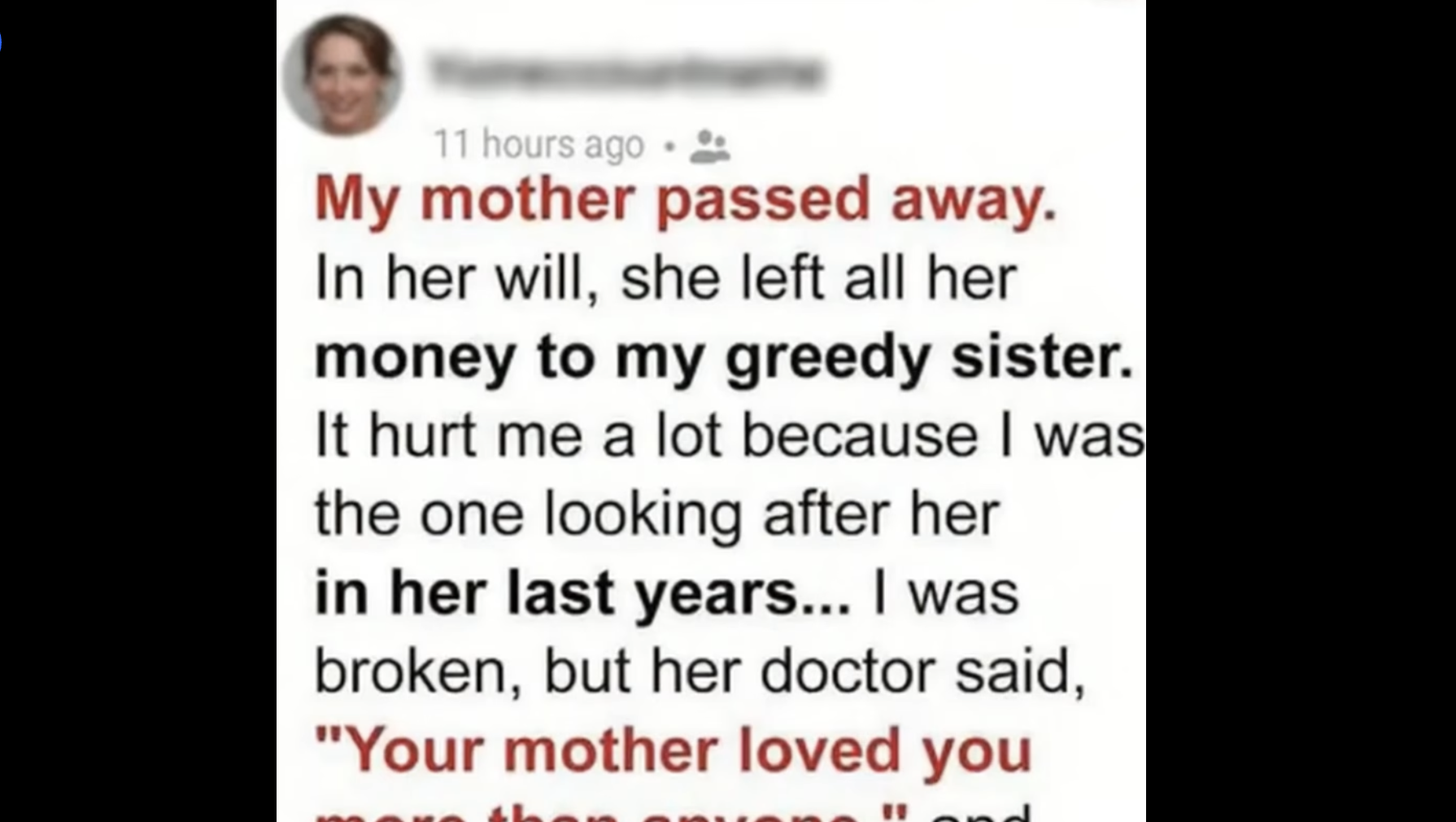I awoke at 2 a.m. to 18 missed calls from my daughter and a single text message: “Dad, help! Come fast!!” The drive to her home was a panicked blur. My daughter and her fiancé appeared astonished to see me standing on their doorstep. She firmly stated, “I never texted you!” However, as I pulled away from their residence, a new text message arrived, and I immediately froze.
It read, “I remember what you did.”
For a fleeting second, my hands gripped the steering wheel, turning ice-cold. I quickly pulled the car over to the roadside. My eyes fixated on the screen. The message displayed no sender name—only a random number. The area code belonged to our old town, two states away.
I had completely erased any memory of that place for years.
I permanently deleted the message. It felt like my past was playing a cruel trick. Perhaps it was a wrong number situation. Perhaps some senseless prank. But upon my arrival home, there was yet another text message waiting for me.
It was a photo of me. Taken in the 90s. I was standing directly in front of my father’s hardware store.
Beneath the image was a new inquiry: “You still sleep okay?”
At this point, I was shaking completely.
I kept this information entirely from my wife. She would invariably start asking too many questions. And there are specific stories I had never shared with her. Stories like why I had never returned to Abingdon after completing college. Why I had severed all ties with my high school friends as if they were dead weight.
Why I consistently flinch when the year 1998 is mentioned in conversation.
However, the texts did not stop arriving. Every night, at the exact same hour: 2 a.m.
A solitary word. A photograph. A pointed phrase.
“You looked the other way.”
“She cried for help.”
“Do your hands still smell like gasoline?”
By the fourth night of this harassment, I found myself unable to sleep. Unable to eat. I could not stop seeing her face.
Her name was Sarika.
She was new to our high school, having relocated from Jersey following her mother’s death. Sarika rarely spoke. She wore oversized clothing. She deliberately sat in the back of the classroom as if attempting to hide from everyone.
But she possessed a natural kindness. And she was brilliant. She was far too brilliant for the boys within my friend group.
We were utterly foolish. We believed we commanded the school simply because our parents owned businesses and properties. My closest friend then was Collin—his father served as a town councilman and was a notorious bully. I disliked a significant amount of Collin’s behavior, but I also never attempted to stop him.
Then came our senior year. Sarika was randomly paired with Collin for a chemistry project. I clearly recall the way he stared at her—as if she represented a direct challenge.
She completely rejected his advances. And this only intensified his malice.
I cannot recall every single action he took—most of the abuse was verbal. Mean-spirited comments. Spreading malicious rumors. Making her feel entirely unsafe without ever physically assaulting her. But one specific night, his actions crossed a serious line.
We were secretly drinking behind the football bleachers. Collin arrived late. He was furious. He announced that Sarika had reported him to the principal for continuous harassment.
“She wants a war,” he declared. “Let’s give her one.”
He forcefully dragged us toward the boundary of her neighborhood. He instructed me to remain by the car. He claimed they were only going to vandalize her house with eggs.
But the strong smell of gasoline reached my nostrils five minutes later.
I quickly ran toward the house and saw Collin standing there with a can in one hand and a lighter in the other. Sarika’s front porch was already thoroughly soaked.
I immediately screamed at him. I shoved him hard. He started laughing.
“Relax,” he insisted. “She’s not even home. I verified that information.”
I managed to throw the lighter deep into the bushes before he could ignite it. I forcibly hauled him back to the car. I warned him that if he ever considered repeating that action, I would immediately go straight to the police.
We never spoke another word after that terrifying night.
Sarika abruptly left school a week later. Some students claimed she had moved back to Jersey. Some said she simply dropped out.
No one truly made an effort to find her.
And I successfully buried the entire event. I buried it deep within myself.
Now, decades later, I was staring at a new message that stated, “You didn’t throw the lighter because of her. You did it to save yourself.”
My stomach churned violently. I desperately wanted to call the number, to apologize profusely, to beg for peace and understanding. But I didn’t even have any idea who was sending these messages.
So I typed a single reply: “Who are you?”
No response was sent back.
I contacted Collin that morning. This was the first time in 20 years I had done so. His phone number remained active. He sounded extremely groggy.
“What the hell do you want?” he muttered into the phone.
“Have you been receiving any text messages?”
He paused. “What?”
“Texts. Regarding… back then. Sarika.”
There was a profound silence.
Then, he finally spoke: “What precisely are you talking about?”
“Don’t lie to me, man. Someone is sending me things. Photographs. Messages. I think—perhaps it’s her.”
His voice immediately dropped to a whisper. “She’s dead, Adarsh.”
I nearly dropped my phone onto the floor.
“What?”
“She passed away. Years ago. She was hit by a car in Chicago. I discovered it online.”
I frantically searched Google right after hanging up. I located an obituary. Same name. Same age. No photograph was included. She had died in 2012. No family members were listed.
But I could not shake the intense feeling that something was fundamentally wrong.
The very next day, a package arrived at my office address. It carried no return address label. Inside, there was a USB drive.
And a brief note: “Watch everything.”
My hands were perspiring as I carefully inserted the drive into my computer.
It was a video file. Extremely grainy. Security footage.
It clearly showed me. At seventeen. Shoving Collin hard on Sarika’s porch. Tossing the lighter away.
My heart immediately stopped beating.
The camera had been cleverly hidden within the bushes.
I watched the entire recording. Shaking the whole time.
Then a second clip began to play.
It was from the following night.
Sarika, returning home. Her face looked swollen. She was crying.
She carefully retrieved the lighter from the bush. She stared intently at it. Then she looked directly into the camera lens.
And whispered something I could not hear.
I remained frozen in my seat for a full hour.
That night, I told my wife absolutely everything.
She embraced me tightly and quietly wept.
“I cannot possibly fix this,” I told her.
“But maybe I can locate whoever sent this material. Maybe I can, at the very least, offer an apology.”
She nodded her head. “Then start your search there.”
I tried calling the number again. This time, someone actually answered.
A man.
He introduced himself as Zubin. He was Sarika’s cousin.
“She lived with us after her mom died,” he explained. “That town utterly broke her spirit. But she never stopped writing. She kept a detailed journal. I didn’t read it until after she died.”
My throat completely closed up.
“She wrote about you,” he continued. “Said you were the only person who didn’t laugh. Said she truly wished you had done more—but she stated she didn’t blame you at all.”
“I absolutely should’ve done more,” I whispered in response.
Zubin remained silent for a moment. “She forgave you a very long time ago.”
“Then why send the texts?”
He sighed deeply. “Not to cause you pain. To wake you up completely. You live this polished, successful life—wife, daughter, business. But you abandoned a girl in the darkness. And that fact consumes you, doesn’t it?”
I offered no reply.
He continued speaking. “She recorded tapes. Letters she never mailed. One of those recordings is intended for you.”
He emailed me the audio file that same night.
I sat on the back porch swing and listened, my hands trembling.
It was her voice.
Soft. Still possessing that slight Jersey accent.
“Adarsh… perhaps you feel you didn’t do enough. Perhaps you are correct. But you managed to stop him. That night, you prevented something horrific. And I saw you do it. I saw the fear in your eyes. I saw you shaking.”
She paused briefly.
“I wish I had found the strength to remain there. But I absolutely could not. I left not because of your actions—but because absolutely no one else stood up for me.”
Another pause followed.
“I genuinely hope you built a good life for yourself. I hope your daughter grows up feeling safe. I hope she never experiences the pain I did.”
By the time the recording ended, I was sobbing uncontrollably.
The following morning, I made a firm decision.
I took a full week off from work responsibilities and drove straight back to Abingdon. I visited the high school. I asked if they had any specific programs focused on harassment prevention. They confirmed they did not.
So I initiated one.
I named it The Sarika Project.
Zubin traveled down to speak at the launch event. We hugged for the first time. We both cried again.
Over the next year, we successfully raised money to assist students who reported abuse but lacked the financial means to fight back effectively. We established scholarships.
I began attending therapy sessions. I finally started disclosing the full truth about my past.
And Collin? The latest I heard, he had run for city council. He lost the election by a significant landslide. Karma moves in quiet, unexpected ways.
And my daughter?
She sent me a text message a few weeks ago: “Dad, I told my friend about The Sarika Project. She said her sister was significantly helped by it. She says thank you very much.”
Sometimes, the weight of the past doesn’t completely disappear. But it becomes significantly lighter when you use that weight to provide support to someone else.
So yes—those 2 a.m. texts fundamentally shook my world to its core. But perhaps that is precisely what I required. To fully wake up.




